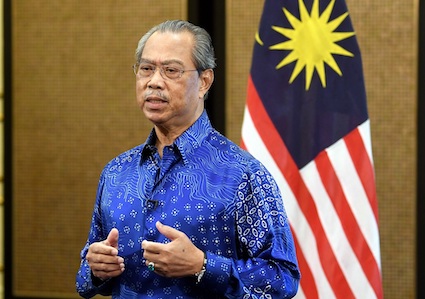Why is the Chinese political ground so cold?

Joceline Tan, KTemoc Konsiders
Tan Sri Muhyiddin Yassin must have been on cloud nine the past few days. One survey after another has pointed to the Prime Minister as the man of the hour.
“Muhyiddin is the glue holding together the Perikatan Nasional ruling coalition, ” said political analyst Dr Azmi Omar.
However, it is also a rather complex situation where many out there approve of Muhyiddin, but not as many support his coalition or the individual parties that make up the coalition.
That was one of the more significant findings from the Merdeka Centre survey.
Muhyiddin’s approval rating among Malaysians was an impressive 69%, but that for his coalition and partners was well below 50%.
“The PM is polling higher than the coalition or his own party. It means he is an asset and can carry the coalition on his back in an election, ” said KRA strategy director Amir Fareed Rahim.
One might even say that, for now, Muhyiddin is Perikatan and Perikatan is Muhyiddin, although a more accurate take is that it is a symbiotic relationship – he needs the coalition as much as the coalition needs him.
The Merdeka Centre survey also found that 51% of those polled believe the country is headed in the right direction, up from 25% who felt the same way during Pakatan Harapan’s final months in power.
This is often seen as the best indication of the level of support for the government.
Polling by two other think-tanks, Kajidata Research and QGen Analysts, also suggest that the Malay base is with Muhyiddin and Perikatan.
“I am a big believer in research data. Three outfits pointing to similar conclusions, that is the sentiment out there, ” said Dr Azmi.
However, political sentiment is deeply polarised, with the Malay electorate on one side and the Chinese dead set against what they call a “backdoor government”.
Muhyiddin’s approval rating among Malays is an astonishing 91% and 65% among Indians but only 33% of the Chinese approve of him.
But the most curious takeaway from the surveys is that the Chinese ground has also grown rather cold towards Pakatan.
More than 50% of the Chinese surveyed were critical of Pakatan. The reasons they cited included unfulfilled promises, working with unreliable partners and infighting.
The more educated class understand that Pakatan did not have time to implement their manifesto but they also believe Pakatan leaders were not sincere about implementing the reforms they promised during their time in Putrajaya.
“I’m concerned but not surprised about the lack of enthusiasm among Chinese. They gave us this golden plate, they expected us to deliver. But we failed to deliver the reforms that mattered most to them, ” said PKR’s MP for Selayang William Leong.
By that, he meant the Chinese aspirations for a more egalitarian society and a genuinely multiracial approach to governance.
“We were gullible to believe Mahathir (Tun Dr Mahathir Mohamad). But he banged the Malay gong and went back to fear-mongering that the Chinese are rich, the Malays will be eaten up by the Chinese.
“These are perceptions of yesteryears, ” he said.
Leong pointed out that the Chinese base was already fed-up with the infighting during Pakatan’s 22 months in Putrajaya.
“But after the Sheraton Move, DAP and Amanah still wanted to give Mahathir another chance.
“They wanted to get back to power at all costs, they portrayed Anwar as selfish for not supporting it.
“They told him to get the numbers to be the PM candidate. They were basically asking him to go get the frogs.
“What happened to principle? It means we are no better than BN. So don’t expect people to root for us, ” Leong.
Universiti Tunku Abdul Rahman (UTAR) lecturer Teh Boon Teck said the Chinese mood is still quite angry, while some have lost hope in politics.
“A sizeable number of Chinese will not take the trouble to return to vote. I’m from Melaka and I have relatives and friends who work in Singapore. I doubt if they will come back, ” he said.
The coming general election will likely affirm that Malaysia is a nation divided.
Race will determine how people vote but the topmost concern of the average voter will be the economy, jobs, business and wages.
Muhyiddin has an edge in this regard because his incumbency will allow him the means to come up with an economic recovery roadmap.
Pakatan has many professionals who can try to do the same and their previous manifesto was impressive, a political map to the making of a modern and truly democratic state.
But will voters take their manifesto seriously this time?
For instance, can they still look voters in the eye and claim to be fighting corruption when one of their own is facing corruption charges in court?
Merdeka Centre executive director Ibrahim Suffian has often stressed that approval ratings should not be equated with how people will eventually vote in an election.
People may not approve of a party but still vote for it, depending on whom they deem to be the lesser evil.
As such, it is not game over yet for Pakatan and there is still more ground to cover for the ruling coalition.

